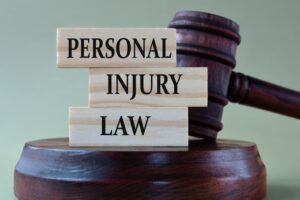When other individuals are negligent, serious accidents, including motor vehicle collisions, dog bites, and premises accidents, may result. In these situations, it’s essential that you have a personal injury attorney advocating for you throughout the process. Your lawyer will be able to answer all of your questions and take the appropriate steps to recover the full compensation you deserve – either through a favorable settlement from the insurance company or litigation in the state court system.
Common Types of Personal Injury Cases
 Personal injury cases arise when individuals suffer harm due to the negligence of others. Negligence occurs when someone fails to exercise reasonable care, leading to accidents and injuries. Here are some of the most common categories of personal injury cases:
Personal injury cases arise when individuals suffer harm due to the negligence of others. Negligence occurs when someone fails to exercise reasonable care, leading to accidents and injuries. Here are some of the most common categories of personal injury cases:
- Truck Accidents: Truck accidents often result in severe injuries due to the size and weight of commercial trucks. Truck drivers’ negligent behavior – including distracted driving, fatigue, or violations of motor carrier regulations – can lead to devastating crashes. These accidents may involve multiple vehicles and can result in significant property damage and personal injuries.
- Car Accidents: Car accidents are one of the most common types of personal injury cases. Common causes include reckless driving, speeding, driving under the influence, and ignoring traffic signals. Victims may sustain various injuries, from minor bruises to severe head trauma or spinal injuries, depending on the accident’s severity.
- Motorcycle Accidents: Motorcyclists are particularly vulnerable on the road, as they lack the protection of a vehicle’s frame. Many motorcycle accidents occur due to the negligence of other drivers who fail to see the motorcycle or misjudge its speed. Injuries from motorcycle accidents often include road rash, fractures, and traumatic brain injuries.
- Bicycle Collisions: Bicycle collisions often involve cars or trucks, putting cyclists at risk of serious injuries. Negligence can occur when drivers fail to yield, do not check their blind spots, or speed near cyclists. Injuries from these accidents can include broken bones, head injuries, and internal injuries.
- Pedestrian Collisions: Pedestrians are particularly vulnerable in traffic. Negligent drivers may fail to stop for crosswalks or become distracted, leading to tragic consequences for pedestrians. Injuries can range from minor cuts and bruises to life-threatening conditions.
- Dog Bites: Dog bites can result from negligent pet owners who fail to control their dogs or allow them to roam freely. Injuries from dog bites can lead to severe physical harm, psychological trauma, and expensive medical bills.
- Slip and Fall Accidents: Slip and fall accidents occur when a property owner neglects to maintain a safe environment. Wet floors, uneven surfaces, or inadequate lighting can cause serious injuries, including fractures and head injuries.
How to Prove the Elements of a Personal Injury Claim or Lawsuit Successfully
To successfully prove a personal injury claim or lawsuit, the injured accident victim (plaintiff) must demonstrate specific legal elements. These elements include duty, breach of duty, causation, and damages. Each element must be clearly established to hold the negligent party (the defendant) accountable. Here’s a breakdown of how to prove each element and the types of evidence needed.
Duty of Care: The first step is showing that the defendant had a legal obligation to act (or refrain from acting) in a certain way toward the plaintiff. This duty of care can vary based on the relationship between the parties. For example, drivers have a duty to drive safely. Evidence can include traffic laws or regulations that demonstrate the standard of care expected in that situation.
Breach of Duty: Once duty is established, the plaintiff must show that the defendant breached this duty through negligent actions or inactions. This may be failing to stop at a red light or not maintaining a property safely. Evidence to support this may include eyewitness testimony, expert opinions, or documents such as maintenance records or accident reports that show how the defendant acted against the established duty of care.
Causation: The plaintiff must prove that the defendant’s breach of duty directly caused the injuries suffered. This can be broken down into two parts: actual cause (the injury would not have occurred but for the defendant’s actions) and proximate cause (the injury was a foreseeable result of the defendant’s actions). Medical records, accident reports, and expert testimony can help establish a clear link between the defendant’s negligence and the injuries.
Damages: Finally, the plaintiff needs to show that they suffered actual damages as a result of the defendant’s negligence. This can include physical injuries, emotional distress, lost income, and medical expenses. Evidence for damages often consists of medical bills, pay stubs, photographs of injuries, and documentation of therapy or treatment received.
In addition to these elements, other types of evidence can strengthen a personal injury claim. Photographs of the accident scene, surveillance footage, and police reports can provide vital information about the incident. Witness statements can corroborate the plaintiff’s account, while witnesses can provide specific knowledge that supports the claim.
An experienced personal injury attorney can navigate this process and ensure that all relevant evidence is effectively used.
What are the Qualities of a Good Personal Injury Attorney?
 When searching for a personal injury lawyer, several important qualities can indicate their effectiveness and reliability. Choosing an attorney with the right attributes can significantly affect your experience and outcomes. Here are some of the most critical qualities to consider:
When searching for a personal injury lawyer, several important qualities can indicate their effectiveness and reliability. Choosing an attorney with the right attributes can significantly affect your experience and outcomes. Here are some of the most critical qualities to consider:
- Experience: A good personal injury lawyer should have substantial experience in handling cases similar to yours. This includes familiarity with the legal processes, understanding the nuances of personal injury law, and a track record of successful settlements or verdicts. An attorney with years of experience will have dealt with various cases and will be familiar with the complexities of the legal system.
- Practice Area: Personal injury law encompasses various types of cases, from car accidents to slip and falls. An effective personal injury attorney is one who regularly handles these types of cases by settling them or taking them to trial.
- Strong Communication Skills: Good communication is essential for building a strong attorney-client relationship. A qualified personal injury lawyer should be able to explain complex legal concepts in a way that is easy to understand. They should also keep you informed about the progress of your case, promptly return phone calls, and answer your questions clearly.
- Empathy and Compassion: Personal injury cases often involve accident victims who are experiencing physical pain, emotional distress, or financial hardship. A good attorney should demonstrate empathy and compassion towards their clients. This quality helps build trust and rapport, making it easier for clients to share their concerns and experiences.
- Negotiation Skills: Many personal injury cases are resolved through negotiations rather than trials. A skilled attorney should possess strong negotiation abilities, advocating for their client’s best interests when dealing with insurance companies and other parties. Effective negotiators can secure better settlements for their clients.
- Reputation: An attorney’s reputation within the legal community and among former clients can provide valuable insight into their capabilities. Look for reviews, testimonials, or ratings from trusted sources. A well-respected lawyer often has strong connections with other legal professionals, which can benefit your case.
- Dedication: A dedicated personal injury attorney is committed to achieving the best possible outcome for their clients. They should be willing to put in the necessary time and effort, conducting thorough investigations and building a strong case based on the available evidence.
Important Questions to Ask a Personal Injury Lawyer
When considering retaining a personal injury attorney, asking the right questions can help you assess their qualifications and suitability for your case. Here are some of the most important questions to consider:
Questions About Background and Experience
- “What is your experience in handling personal injury cases?” It’s important to know how long the attorney has been practicing personal injury law and the types of cases they typically handle. An attorney with extensive experience in personal injury law will be better equipped to handle the particular complexities of your case.
- “Have you handled cases similar to mine?” Ask if they have experience with cases like yours, whether it involves a car accident, medical malpractice, or another type of personal injury. Familiarity with your specific situation can enhance their ability to advocate effectively for you.
- “What is your success rate?” Inquire about their track record in terms of settlements and verdicts. While past performance does not guarantee future results, a solid success rate can provide insight into their effectiveness as an attorney.
- “Do you have any professional affiliations or certifications?” Membership in professional organizations, such as the American Bar Association (ABA) or local bar associations, can indicate a commitment to maintaining high ethical standards and ongoing education in the field.
- “Will you be handling my case personally, or will it be passed to another attorney or team?” Clarifying who will be managing your case is crucial. You want to ensure that your case receives personalized attention rather than being handed off to a less-experienced associate.
Questions Pertaining to Your Individual Case
 “What is the likely outcome of my case?” While no attorney can guarantee results, an experienced lawyer should be able to provide a realistic assessment of your case’s potential outcome based on the facts and circumstances.
“What is the likely outcome of my case?” While no attorney can guarantee results, an experienced lawyer should be able to provide a realistic assessment of your case’s potential outcome based on the facts and circumstances.
- “What is the estimated timeline for my case?” Understanding how long your case may take – from initial filing to resolution – can help you manage expectations and plan accordingly.
- “What fees do you charge, and how are they structured?” It’s essential to discuss attorney fees upfront. Many personal injury attorneys work on a contingency fee basis, meaning they only get paid if you win your case. Clarifying this aspect will help you understand your financial obligations.
- “What kind of evidence will be needed for my case?” Inquire about the types of evidence that will strengthen your case, such as medical records, photographs, or witness statements. Understanding this can help you gather the necessary documentation.
By asking these questions, you can better evaluate a personal injury attorney’s qualifications and ensure that you choose someone who aligns with your needs and goals for your case.
How Can an Experienced Personal Injury Attorney Help with Your Case?
A knowledgeable personal injury attorney can be an invaluable asset when filing a claim or lawsuit. Their knowledge and experience can significantly affect the outcome of your case. Here are several ways that a skilled attorney can assist you throughout the legal process.
- Understanding Legal Concepts: Personal injury law involves various legal principles that can be complex and difficult to grasp. A knowledgeable attorney can explain these concepts clearly, helping you understand your rights and the legal framework surrounding your case. This understanding is crucial for making informed decisions.
- Case Evaluation: An experienced attorney can assess the details of your case to determine its strengths and weaknesses. They will review evidence, such as medical records and accident reports, to gauge the potential for success. This evaluation allows you to set realistic expectations for your claim or lawsuit.
- Gathering Evidence: Building a strong case requires substantial evidence to support your claims. A personal injury attorney knows what types of evidence are necessary, such as witness statements, expert testimony, and medical documentation. They can effectively gather and organize this evidence to strengthen your case.
- Negotiating with Insurance Companies: Dealing with insurance companies can be daunting, as they often seek to minimize payouts. A knowledgeable attorney can handle negotiations on your behalf and advocate for your best interests. They understand the tactics insurers may use and can counteract them to secure a fair settlement.
- Filing Legal Documents: Personal injury cases involve various legal documents that must be filed correctly and on time. An attorney is familiar with the necessary paperwork and deadlines, ensuring that your claim is filed properly to avoid potential delays or dismissals.
- Representing You in Court: If your case proceeds to trial, having a knowledgeable attorney is essential. They will prepare your case, present arguments, and cross-examine witnesses. Their courtroom experience allows them to effectively navigate legal proceedings, increasing your chances of a favorable outcome.
- Calculating Damages: An attorney can help determine the full extent of your damages, including medical expenses, lost income, and emotional distress. They understand how to quantify these losses accurately, ensuring you seek appropriate compensation for your injuries.
- Providing Emotional Support: The aftermath of an injury can be emotionally challenging. A personal injury attorney can provide reassurance and support, guiding you through the process and allowing you to focus on recovery.
A knowledgeable personal injury attorney plays a critical role in effectively handling your claim or lawsuit, from understanding legal complexities to advocating for your rights. Their experience can significantly enhance your chances of achieving a favorable resolution.
Talk with an Experienced Personal Injury Lawyer in Your Area Today
If you recently sustained injuries due to someone else’s negligence, a personal injury attorney can handle every step of your case for you – from answering all of your questions to filing a claim on your behalf to aggressively negotiating with insurance company representatives. If the insurance company does not make you a reasonable settlement offer, your lawyer can litigate your case to a swift resolution in the state court system.
 Truck Accident
Truck Accident
 Motorcycle Accidents
Motorcycle Accidents
 Wrongful Death
Wrongful Death
 Car Accident
Car Accident







